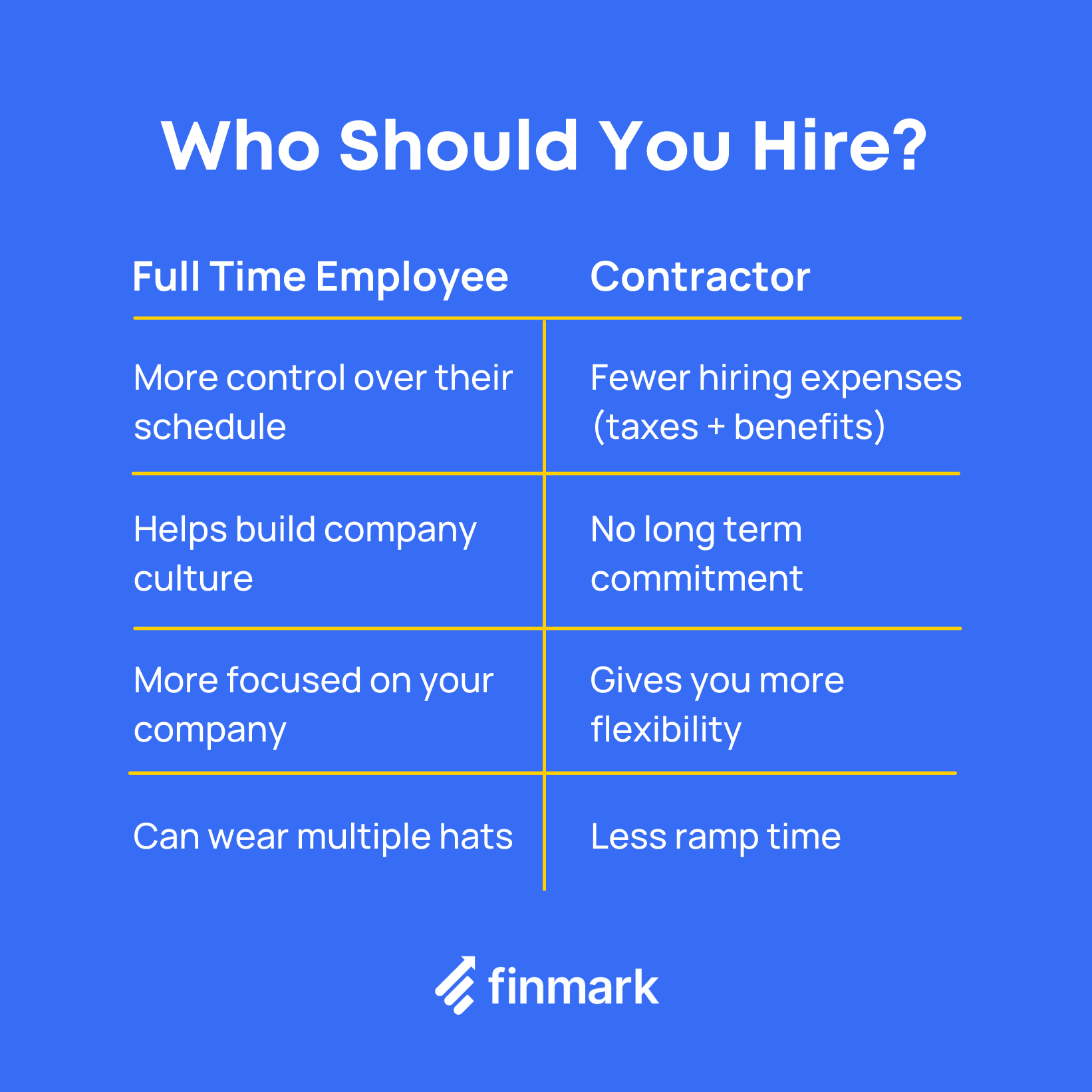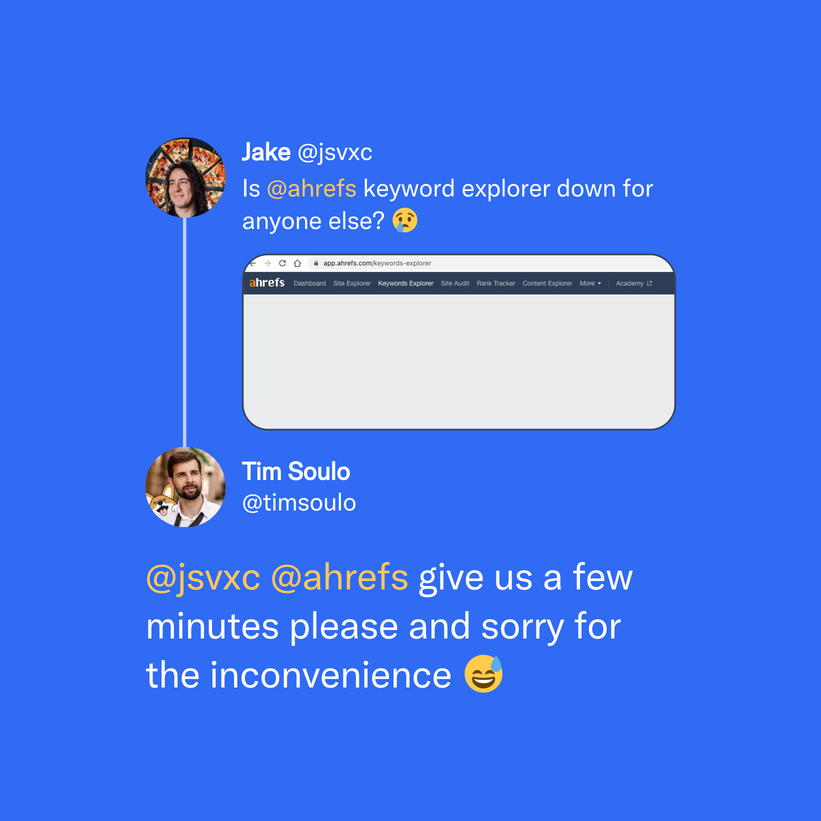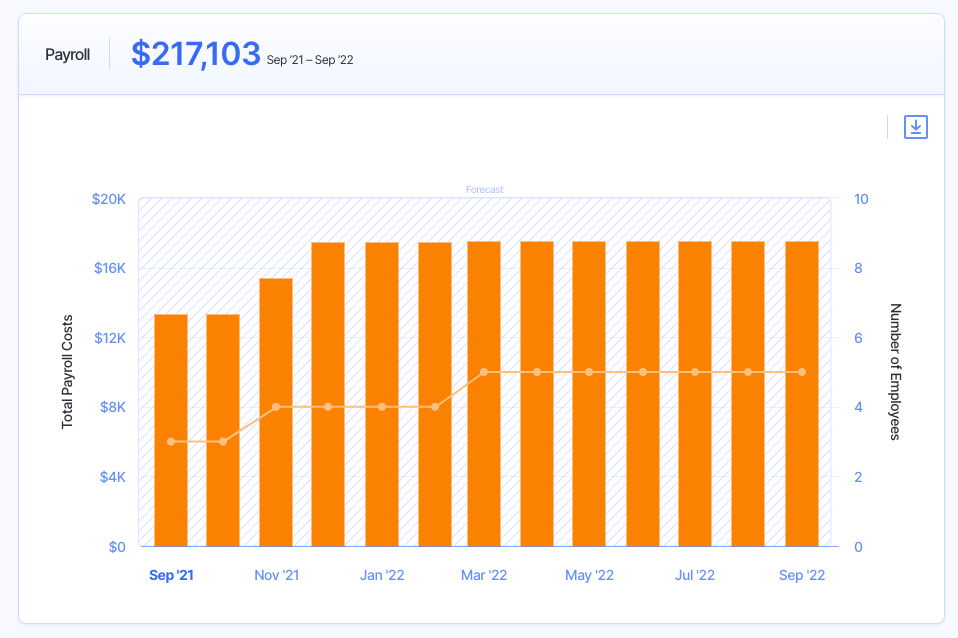Full-Time Employees vs. Contractors: Who Should You Hire?

We recently published a massive guide about hiring your first employees as a startup. I highly suggest reading it if you’re in the process of making your first hires.
However, one thing we didn’t touch on in that article is the contractor vs. full-time employee decision.
As an early-stage startup, is it better to hire full-time salaried employees or contractors?
The short answer is, it depends.
What does the decision depend on? That’s exactly what we’re going to cover in this guide.
What is a Contractor?
For the purposes of this article, we’re using “contractor” as an umbrella term to describe most non-payrolled employees.
That includes:
- Freelancers: People you hire on a per-project basis. For example, you hire a freelance writer to write an article, a web developer to fix bugs on your site, etc.
- Temp-to-hire: Working with an agency or directly with a person on a contract basis with the potential to make them a full-time employee.
- Agencies: Contracting out work to an agency. For example, a PR agency, design agency, etc.
- Contract work: You hire an independent contractor for a set period of time. For instance, you hire an SEO contractor for a six-month term to create a strategy for you and start the implementation process.
There are some other scenarios, but essentially we’re talking about non-employees.
What’s the Difference Between Full-Time Employees and Contractors?
On the surface, full-time employees and contractors may seem similar. You hire them to work for your company or to do specific tasks.
However, there are some major differences between the two, and as a founder, it’s important to know the distinction between full-time employees and contractors.
Payroll & Taxes
One of the biggest differences between full-time employees and independent contractors is how they’re paid.
Full-time employees are on your payroll. That means you need to give them a W-4 form, pay employment taxes, and will likely offer some sort of benefits like health insurance and vacation time.
Contractors on the other hand are treated like your other expenses and aren’t paid through payroll. Depending on the situation, you might have them complete a W-9 form and contractors are responsible for filing their own taxes.
Also, contractors typically don’t get any benefits (health, vacation, etc.) from the companies they work with.
Keep in mind, this is just general information. There are always exceptions and different rules that may apply to your situation. You should always consult a tax professional for any questions regarding paying workers (contractors or salaried employees).
Here are some other resources that might be helpful:
- https://smallbusiness.chron.com/payroll-vs-independent-contractors-30934.html
- https://www.irs.gov/newsroom/understanding-employee-vs-contractor-designation
- https://www.irs.gov/businesses/small-businesses-self-employed/independent-contractor-self-employed-or-employee
Exclusivity
Another difference between full-time employees and contractors is the level of exclusivity.
Contractors will typically work for multiple companies at the same time. When you hire them, there’s no expectation that you’re the only company they’re working with unless it’s specified in your agreement.
On the flip side, most full-time employees will only work for one company at a time. Of course, there are certain exceptions like employees who have part-time jobs or side hustles. But generally speaking, full-time employees don’t work for several different companies at once like contractors.
Level of Commitment
On a similar note, being a full-time employee requires a higher level of commitment than being a contractor.
Since contractors work with multiple companies, they decide how to split their time and which projects to prioritize. They might work on your project a couple of days a week and divide the rest of the week among their other clients.
Here’s an example of why this is an important distinction.
Let’s say you have an urgent issue that needs to be handled. As a founder or manager, you can ask full-time employees to make that issue their top priority.
Contractors on the other hand have to prioritize your urgent issue among their other clients. Sometimes that means your issue might be the second or third priority for them.
Scope of Work
When it comes to working in an early-stage startup, it’s common for employees to wear multiple hats. Engineers might help with customer support issues. A marketer might do some design work, and so on.
With contractors, that’s not the case. Contractors have a more defined scope of work because you hire them for a specific project or task.

When Should You Hire Full-Time Employees?
Now that you know the difference between full-time employees and contractors, let’s talk about when it makes sense to hire a full-time employee instead of a contractor.
They’re Working on a Core Part of Your Business
There are certain roles you probably don’t want to hire a contractor for. For instance, if you’re a non-technical founder building a SaaS company, it makes sense to hire a full-time engineer rather than relying on contractors.
Since the success of your business depends on how well your software is built, you need someone who’s fully committed to it and working on it long term. Using contractors who can come and go as they please can lead to inconsistency, less structure, and other issues long term.
As a general rule of thumb, if it’s an essential part of your business, consider hiring a full-time employee.
You Need Them to be Available During Specific Hours
With the shift towards remote work, startups are becoming more flexible about the typical 9-5 working hours. However, with full-time employees, most startups at least set a base expectation of availability.
If you need employees to be available during specific hours of the day, then a full-time employee might be a better fit since you have less control over a contractor’s schedule.
For instance, you may want a full-time customer support person who’s available during normal business hours so you can respond to issues or questions quickly.
You Want to Embed The Into Your Company
Great contractors will do their best to learn about your company, but the reality is the relationship contractors have with your company is different than full-time employees.
For instance, there’s certain information you’d share with full-time employees that you wouldn’t share with a contractor.
Also, since employees are with your company long-term and likely interact with each other on a more regular basis, they’re naturally going to be closer than a team of independent contractors.
It’s also easier to build a company culture with full-time employees. One tip I got from Rami Essaid (CEO of Finmark) on hiring your first employees is to look for cultural pillars.
Cultural pillars are the people that make your company great to work for and give it an identity. They’re the people who get conversations started with everyone, advocate for your company publicly, and are like the “glue” that pulls everyone together.
A good example of this is Tim Soulo, the CMO of Ahrefs. He’s active on social media, speaks at conferences, and has become “the face” of the company in many ways. In fact, Tim is so vocal about Ahrefs that I used to think he was a co-founder!

If your goal is to build up your cultural pillars, you’ll want full-time employees, not just contractors.
You Want to Work With Them Long Term
You’ve probably noticed a recurring theme here. Generally speaking, there’s not an expectation for independent contractors to stick around long term. In fact, the average contract worker in the U.S. tends to stay employed for about 2-3 months.

Part of the reason why contractors don’t stick around too long is that most people use them on an as-needed basis, whereas you hire full-time employees when you have a long-term and ongoing need.
Roles like your head of marketing, customer success manager, and similar positions that you know you’ll need for years should be full-time employees rather than contractors.
You Want to Supervise & Train Someone
One of the benefits of contractors is they don’t require supervision or a ton of training. In fact, they prefer less supervision.
If you want to bring in someone to supervise and train, then a full-time employee makes more sense than a contractor.
When Should You Hire Contractors?
Surprisingly, a lot of founders pre-maturely hire full-time employees when an independent contractor makes more sense. Here are some scenarios when you should hire a contractor instead of a full-time employee.
You’re Unsure if You’ll Need Them Long Term
If you have doubts about whether or not you’ll need someone around long-term, it’s a sign you should consider hiring a contractor instead of a full-time employee.
For instance, in the early days of your startup, you might want to experiment with different acquisition channels. One of the channels you’re considering is Facebook Ads, but you’re not sure about whether or not it’s something you want to do long term.
In that scenario, it wouldn’t make much sense to hire a paid acquisition specialist full-time. You could hire a contractor to test it out and if it works out and is something you want to do long-term, then consider making it a full-time position.
It’s a Special or Short-Term Project
Do not, I repeat, do not hire a full-time employee for a special project. Similar to the previous tip, short-term work should be handled by short-term workers.
For instance, say you initially launched an MVP version of your website using a WordPress theme. Now that you’re gaining traction, you want to revamp it. Some founders would hire a full-time designer anticipating that they’ll need ongoing design work after the initial project.
However, it makes way more sense to hire a contractor and have them work on this one project. If you need more design work down the road, then revisit it later. But if you only need help for a specific project, hire a contractor.
You Don’t Need Them to Work Full-Time Hours
While some companies have shifted away from a traditional 40-hour workweek, it’s still the standard in the U.S, even among startups.
However, if you don’t need people to put in full-time hours why hire a full-time employee?
This is pretty straightforward for work that’ll only require less than 10 hours per week. Where founders tend to run into issues is when they need someone to commit 20-30 hours per week.
That’s generally the point when you’re forced to decide between a contractor or a full-time employee.
The issues with hiring a full-time person to do part-time work are:
- You end up paying a full-time salary (and benefits) for someone who’s working part-time
- You feel like you need to “find things for them to do” to fill their time
- You risk having to let them go because you realize you didn’t need a full-time person after all
The thing to remember here is that it’s less about an arbitrary number like 40 hours per week, and more about the amount of work you have for the person to do.
If you don’t think you’ll have enough work to warrant a full-time person, hire a contractor instead.
You Need Specific Expertise or Skills (Quickly)
You might hire a junior or entry-level full-time employee that you can train, but it’s rare that you’ll hire an independent contractor that’s a beginner.
For instance, a founder who’s really good at marketing but just doesn’t have the time to dedicate to it might hire someone fresh out of college because they can pay them less and train them to become a better marketer.
You’re investing the time now because that person will (hopefully) stick with you long-term and grow their skills.
However, if you’re hiring a contract worker, you likely want them to get started right away. You don’t need to train them or teach them the skillset, you just need to tell them about the specific needs of your project.
You Want to Operate as Lean as Possible
Perhaps the easiest way to decide between a full-time employee or contractor is to look at your finances.
Can you afford to hire a full-time employee?
It sounds straightforward enough, but there’s more to consider than just salaries.
Full-time employees come with added expenses like taxes, insurance, equipment (computers, monitors, etc.), and more. You need to make sure you can afford to cover all those expenses for at least the next couple of years, not just the next couple of months.
This is when building a financial model comes in handy. With a financial model, you can forecast the cost of new employees and see how it impacts your runway and burn rate long term.
Build and forecast your hiring plan with Finmark!
If you’re unsure about whether or not you can afford a full-time employee, I highly recommend building your financial model in Finmark. It’s easy to set up and you can even try it for free.
If it turns out that hiring a full-time employee doesn’t make financial sense, then you can go with a contractor instead. The benefit of a contractor is there’s not a long-term commitment and you’ll avoid some of the added expenses that come with full-time employees.
As an early-stage startup, you may want to operate as lean as possible initially until you’ve established product-market fit or have consistent revenue before hiring full-time employees.
Contractors can be a great solution in the meantime.
Contractor or Full-Time Employee?
As you can see, there are a few different factors to consider when deciding between a full-time employee and a contractor.
As tempting as it might be to hire a full-time employee when you need help, realize that it’s not your only option. In fact, sometimes it’s not even the best option.
Think about your specific needs and factor in everything above. And if you need help creating a hiring plan and forecasting the cost of employees and contractors, sign up for a free trial of Finmark to build your financial plan.
This content is presented “as is,” and is not intended to provide tax, legal or financial advice. Please consult your advisor with any questions.

